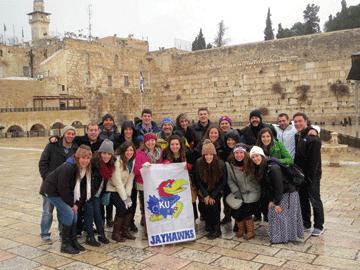
Editor’s Note: On Jan. 7, 20 students from KU Hillel travelled to Israel through KU Hillel’s Israel Leadership Mission (ILM). ILM is a high-level immersive experience in Israel for students that demonstrate a commitment to serving a leadership role within the Jewish community upon their return. {mprestriction ids="1,3"}The trip is intended to help students gain a deeper understanding of Israel’s economic and social issues that it faces on a daily basis. The Jewish Federation of Greater Kansas City has been funding ILM for the past seven years. Throughout the trip, students interacted with Jewish community leaders, peers and children while volunteering at many of the projects that the Jewish Federation supports. ILM is a way for students to see the issues first hand that Israeli’s are facing and then bring back what they have learned to KU.
Waking up at 6 a.m. is not usually my ideal start to a Saturday morning, especially during Shabbat in Tel Aviv. It being our last day in Israel though, I felt compelled to take advantage of everything the city had to offer. I dragged myself out of bed and jogged from our hotel down to the beach located a few miles away, just in time for the sunrise. Laying down in the sand and listening to the soothing waves of the Mediterranean Sea crash around me provided the perfect setting to reflect on this trip. This is what I came up with:
I wish it was enough to say that this trip was life-changing, but even that doesn’t do it justice. Before embarking on this trip, I thought I loved Israel. My KU Hillel Birthright experience two years ago was an incredible one. I came back to the States with a surface-level love for a country that, I now realize, I knew frustratingly little about.

KU Hillel’s Israel Leadership Mission paved the way for me to break down the idealistic version of Israel that I had created in my head. It was replaced with a deep respect for and understanding of a people and country riddled with problems. Israel isn’t perfect. Not only does it have to worry about its own national security arguably more so than any other nation in the world, but on top of that it struggles with issues of immigration, rights of minority populations, and finding ways of maintaining a Jewish state while still continuing to be a democratic society, just to name a few.
I can compare my relationship with Israel to that of almost any other relationship I’ve ever formed. Only once the relationship has become more than just a surface-level understanding can a deeper appreciation occur. There are some things happening in Israel that we witnessed that I believe in wholeheartedly, specifically in Ramla. I believe the array of cultures, religions and nationalities we witnessed coexisting in the city was a step in the right direction if our world is ever to achieve peace, especially in the Middle East.
On the other hand, there were some things we learned about that didn’t sit right with me, including Israel’s appalling immigration policy. With each new topic, I found myself trying to see everything from all angles, struggling to make sure I understood so that I could form an educated opinion. At group reflection sessions, those opinions were examined, questioned, and challenged by not only the staff, but the well thought out opinions of my peers as well. The point wasn’t to come to a general consensus, but to internalize the situations and individually attempt to make sense of how we felt about what was going on.
By the end of the trip, it seemed the majority of us were better versed and more passionate about the problems threatening Israel’s future than we were about our home country’s. This trip showed us a side of Israel that very few outsiders get to see, a side very few of us even knew existed 10 short days ago, and a side that we will never forget.
When all was said and done, I realized that it was learning about Israel and all of its flaws that made the country so beautiful to me. Beginning to understand the array of current social and economic issues happening in Israel today not only deepened my passion and pride for the country, but for the idea of a global Jewish peoplehood as well. I’m heading back home fully invested in Israel, the good, the bad, and the ugly, for the long term. Whether this is financially, professionally, or even involves making Aaliyah one day, I have yet to figure out. I do know that my Jewish identity has flourished on this trip, and I am looking forward to finding a meaningful way to remain inextricably involved in Israel’s future.
KU senior Nikki Multer is a member of Congregation Beth Torah.{/mprestriction}